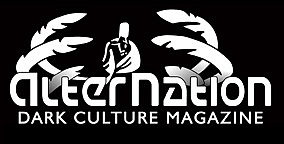Analog Angel - Dischord
The best fragments from the Analog Angel’s debut album titled Dischord are these in which the band doesn’t sound familiar to Depeche Mode. Unfortunately, there are hardly any such moments. That‘s a pity because the group seems to have a potential and with respect to their performance it presents itself quite well. Synth pop in this edition is not an old hat, the band is capable of imparting a modern touch to this stylistics. The fresh attitude towards the electronic playing format is worthy of respect and recognition. The more so because, the Analog Angel group members weren’t newcomers to this profession. Three Scots (Glasgow native citizens) who form this band – John Brown, Derek MacDonald and Robert Marshall – participated years ago in the project called Dr Strangelove. Once the group became famous of the song titled Why Do You Do? which was misconstrued as another production – yes, indeed – of Martin L. Gore’s team. In order to avoid the form of classic niggling for no reason in this review (one, the undersigned wouldn’t like to be regarded as another clever-clever impotent by the substantial majority of readers) – here is a short, but a concise list of accusations aimed at AA.
Firstly – the singer. John Brown has a voice similar to Dave Gahan. It’s not yet a crime but it’s worse when he tries to imitate the way which sings DM’s frontman – his characteristic timbre, vocalization etc. The vocal manner á la Dave doesn’t do a credit in this case. Sometimes, it’s even annoying (like in High Heels or Down On Your Knees). Secondly – lyrics. From time to time it’s gloomy and existential with personal remarks (if believe in what the musicians say in the interviews) but also with more or less detectable borrowings (obvious from whom) and references (evident to whose artistic work). Analog text writers use the same set of subjects, motives and even the same phrases and words which Martin L. Gore did (check it out). Thirdly – compositions. It is difficult to omit some repetitions in the stylistics which the band has chosen. It’s even harder to overcome the temptation to use patterns hammered out by the rivalry (or rather own masters). The men from Analog Angel are quick to learn. They derive from Depeche Mode’s output quite skilfully. It cannot be perceived as a plagiarism. None of the songs on the Dischord album deserve to be called that way. The point is, there is a sense of déjà vu while listening to the debut’s record of Scots.
Finally, a few words about so-called pluses. Despite the accusations which I put forward the trio from Glasgow I’m not considering the title Dischord as worthless. It’s a very coherent and consistent album, excellently produced and modernly sounded. So what if it’s not original? It would be appropriate to wish the band more own invention in the subsequent publications.
Tracklist:
01 Touched
02 Television
03 Shadows
04 Ich Habe
05 High Heels
06 Down On Your Knees
07 No Contest
08 What We've Become
09 Deviance
10 Down On Your Knees (Original Innocence)
11 Down On Your Knees (Carpet Burn Reprise)
12 Television (900 Channels Remix)
Other articles:
Firstly – the singer. John Brown has a voice similar to Dave Gahan. It’s not yet a crime but it’s worse when he tries to imitate the way which sings DM’s frontman – his characteristic timbre, vocalization etc. The vocal manner á la Dave doesn’t do a credit in this case. Sometimes, it’s even annoying (like in High Heels or Down On Your Knees). Secondly – lyrics. From time to time it’s gloomy and existential with personal remarks (if believe in what the musicians say in the interviews) but also with more or less detectable borrowings (obvious from whom) and references (evident to whose artistic work). Analog text writers use the same set of subjects, motives and even the same phrases and words which Martin L. Gore did (check it out). Thirdly – compositions. It is difficult to omit some repetitions in the stylistics which the band has chosen. It’s even harder to overcome the temptation to use patterns hammered out by the rivalry (or rather own masters). The men from Analog Angel are quick to learn. They derive from Depeche Mode’s output quite skilfully. It cannot be perceived as a plagiarism. None of the songs on the Dischord album deserve to be called that way. The point is, there is a sense of déjà vu while listening to the debut’s record of Scots.
Finally, a few words about so-called pluses. Despite the accusations which I put forward the trio from Glasgow I’m not considering the title Dischord as worthless. It’s a very coherent and consistent album, excellently produced and modernly sounded. So what if it’s not original? It would be appropriate to wish the band more own invention in the subsequent publications.
Tracklist:
01 Touched
02 Television
03 Shadows
04 Ich Habe
05 High Heels
06 Down On Your Knees
07 No Contest
08 What We've Become
09 Deviance
10 Down On Your Knees (Original Innocence)
11 Down On Your Knees (Carpet Burn Reprise)
12 Television (900 Channels Remix)
Other articles:
- Interview with Analog Angel - 2009-11-23 (Interviews)

